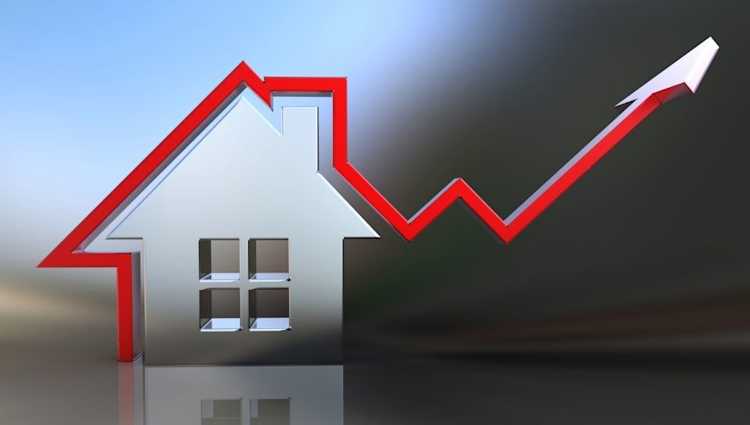Inflation and the Housing Market
by Becca Stewart - March 9th, 2022

Prices are high on everything from eggs to energy. Inflation is at its highest rate since 1982, with the consumer price index up 7.5 percent since January 2021. For those PCSing this year, homeownership might feel impossible. But even though inflation and the housing market feel intertwined, that’s not necessarily the case.
Despite rising prices on goods and services, homeownership remains a stable investment in 2022.
Do inflation and the housing market go together?
Inflation and the housing market are related, but they aren’t inextricably linked.
Inflation is the increase in the price of goods and services: groceries, gas, energy, automobiles, and clothing. These prices largely depend on supply and demand. Economists blame the current inflation increase on the COVID-19 pandemic, which created supply chain issues, labor shortages, and ultimately led to higher costs across the country.
Housing prices depend on supply and demand, too. Even before the pandemic, there were many more buyers than homes. Homebuilders couldn’t build fast enough to keep up with demand. Housing inventory was startlingly low.
When the pandemic hit, it went from bad to worse. Homebuilders stopped construction. Potential sellers sheltered in place instead of listing their homes. And people living in urban areas left their multifamily homes in search of larger houses in suburban and rural areas. This all led to increased demand and drastically reduced supply. It all came to a head in summer 2021, with home prices skyrocketing and inventory at historic lows.
While inflation and the housing market have both seen shifts in the supply-demand balance, one is not necessarily dependent on the other. Currently, inflation remains high while the housing market is finally seeing some relief.
Why you should still buy a home in 2022
Experts say 2022 will see more housing inventory, with more homeowners selling and more builders starting construction on new projects. This increased inventory is welcome news to buyers, particularly first-time homebuyers and those purchasing houses at lower price points. The 2021 real estate surge saw many of these lower-tier buyers outbid by corporate buyers and other investors, all of whom competed for the limited affordable inventory.
As inventory continues to increase, the competition should cool. Ultimately, this shift will lead to less competition among buyers and more moderate prices. To be clear, we probably won’t see a decrease in prices any time soon, but rather a slower increase than we saw in 2021.
To answer the burning question, yes, now is a good time to buy a home. With more inventory and less competition compared to last year, buyers have more bargaining power. In 2021, buyers routinely offered more than asking price—and still were outbid. But buyers have more room for negotiation in 2022.
Plus, even though the market is slowing, it shows no signs of stopping. Home values continue to rise year over year, meaning whatever home you purchase this year will likely increase in value before your next PCS.
Use a VA loan to stretch your dollar
One way that inflation and the housing market are undeniably linked is in our pocketbooks (actually, in our banking apps, because it’s 2022). Sure, most service members received a bit of a pay bump and a BAH increase this fiscal year, but it’s not enough to keep up with inflation.
The rising cost of everything from diapers to diesel means we now have to stretch our dollars further. Consequently, saving up for a down payment is more challenging than ever.
As a service member or veteran, you can use a VA loan to purchase a home. With a VA loan, homebuyers can secure a loan with $0 down and no private mortgage insurance. These loans often have lower interest rates than conventional mortgages, too, freeing up more capital to spend on everyday items.
The VA loan program is one way to achieve the dream of homeownership, even during unprecedented inflation. Learn more about the VA program and its benefits here.
The future of inflation and the housing market
While it’s difficult to say for sure, history tells us that the economy will even out eventually. Bottlenecks at shipping ports will sort themselves out, supply shortages will abate, and consumer spending will shift back to its pre-pandemic patterns.
Unfortunately, though, inflation will have one significant impact on the housing market. As inflation rises, so do federal interest rates. During the pandemic, the Federal Reserve slashed interest rates, which caused mortgage lenders to lower their rates.
As inflation concerns mount, the Fed will likely raise interest rates in an attempt to cool inflation. Some experts say the Fed could increase rates twice or more this year. Mortgage interest rates will rise in turn, leaving homeowners with less wiggle room in their monthly budgets.
Homeownership remains a sound investment in 2022, even amid continuing inflation. Prospective home buyers should consider buying sooner rather than later, since rising interest rates will impact mortgages, too. Start by contacting a reputable mortgage lender to discuss available lending solutions, including VA loans.









